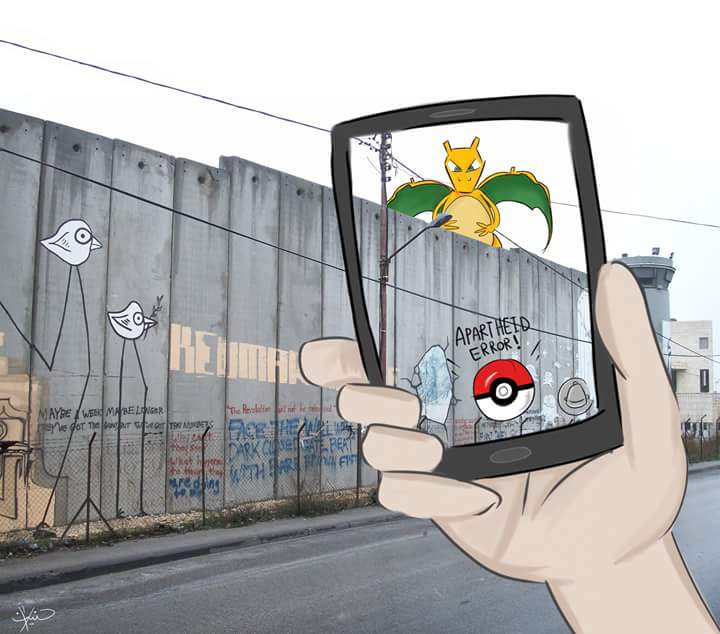It’s been a little less than three weeks since Pokémon Go took over the world. Within days of its U.S. release the app garnered 7.5 million downloads making $1.6 million in daily revenue. Although reviews have been mixed, the game has been praised for its ability to help those with social disorders, criticized for safety concerns and used to draw attention to greater social issues.
Pokémon Go, created by Niantic, is a free-to-play location-based augmented reality mobile game. With the help of your phone’s GPS and camera it allows you to capture, battle and train creatures called Pokémon who appear on the screen as if they’re in the real world.
Although the app launched with a number of technical issues that disappointed critics and fans, it has continued to receive praise for its overall experience and motivation to explore the world around you. And within just a few days of the release, players everywhere were taking to the Internet to talk about how the game was helping their mental health.
18-year-old Tumblr user Ari told BuzzFeed News that they’ve had anxiety and depression for the past three years, which resulted in them barely leaving their home.
“[A]s soon as I got Pokémon Go I was able to leave the house, and I walked outside for hours and suddenly found myself enjoying it,” Ari said. “I had a rush of dopamine whenever I caught a Pokémon, and I wanted to keep going.”
21-year-old Brianna, who has been diagnosed with personality disorder, depression and social anxiety, said that after downloading the game she spent a day just walking around the city she lives in.
“I was in a really bad low before I got the app,” she said. “I wouldn’t say it’s [the game] changed that completely, but it’s kept me busy, and given me a lot of motivation.”
It’s this new inspiration to go out and explore one’s surroundings that contributor Amy Butcher focuses on in her recent piece for The New York Times.
“My community came to life in vibrant shades of pastel blue and green, the grid of my neighborhood alive with magic,” Butcher writes.
On a walk one Monday evening, Butcher says she started to “notice everything.”
“The neighborhood buzzed with people out exploring, an enormous uptick for a Monday evening,” she writes. ”The whole idea of Pokémon Go is to visit where you have not been, to trace sites both new and foreign.”
And it isn’t just players in the U.S. who are rediscovering the places they live through the game’s exploration. Users across the world have found loopholes to download the game if it has yet to be released in their country or is blocked.
Iran, one of the most restricted Internet environments in the world, has even caught Pokémon Go fever.
Iranian players have used VPNs to download the game, reaching out to online communities such as Reddit to find other users in their area.
According to Hasan Karimi Ghodosi, the director of the National Foundation for Computer Games (NFCG), the “status of the game in Iran would depend on the game developer’s cooperation with authorities.”
But it’s not just authorities in Iran who have tried to set up barriers against the game’s increasing popularity. Saudi Arabia’s top clerics have officially reminded followers about a fatwa issued in 2001 against Pokémon. The 2001 edict states that the Pokémon card game violates Islamic law because of it’s references to evolution and its use of “the symbols and logos of devious religions and organizations” and other “forbidden images.”
Regardless of pushback, the game’s popularity hasn’t slowed down. Using the sense of community Pokémon Go fosters, people and organizations are working to capture the world’s attention by partnering its attractiveness with important social issues.
Palestinians have taken to social media with the help of the game to talk about life on the West Bank and Gaza Strip under Israeli occupation. A number of pictures showing wounded and sometimes dead Pokémon have gone viral. A photo of a Pikachu lying in a pile of rubble outside of a demolished site with a health status indicating “Dead” made rounds on Twitter. Also popular: a Charizard peaking over a wall that separates Israeli territory from the West Bank displays a phone screen with the message “Apartheid Error!”
Twitter and Facebook users joined in the conversation about not being able to “catch ‘em all” because of restricted geographic locations.
“There is a [P]okemon down the street in the settlement,” Facebook user Abd Elrahman Salayma writes. “How the hell am I going to catch it?”
But players in Palestine and Israel aren’t the only ones trying to use the popularity of Pokémon Go to talk about bigger issues.
The Revolutionary Forces of Syria Media Office (RFS) have been tweeting photos of children holding printed pictures of Pokémon with captions that let viewers know they are in Syria and need people to help them. Other altered images have also been shared such as a crying Pikachu sitting on the steps of a destroyed building with a young boy.
Last week, Saif Aldeen Tahhan, a Denmark-based graphic designer and activist, posted to Facebook a mockup of the game called “Syria Go,” a Syrian version of Pokémon Go in which the items users seek are essentials such as medical supplies, a life vest and a home.
“People on social media talk about Pokémon all the time so I created these images to draw attention to suffering during the war and what Syrians are really searching for,” Tahhan told CNN. “I can tell you, the Syrian people are not looking for Pokémon.”
However silly it may seem to have people running around, catching imaginary creatures on their phones, it’s the games ability to bring people together that’s truly powerful. With all the complaints about social media weakening in-person interactions, Pokémon Go helps users spend time with others both alike and unlike and explore the world together.
Asma Uddin, AltM Editor-in-Chief and Kaitlin Montgomery, AltM News Editor




